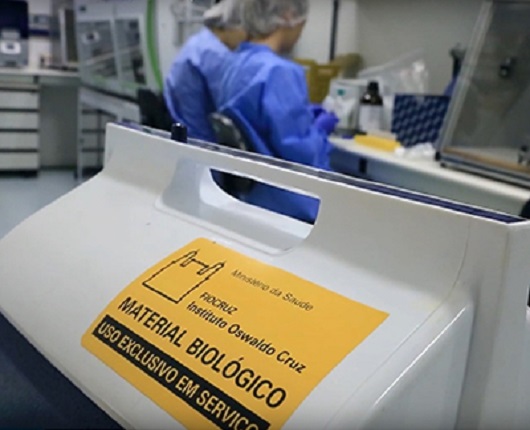Fiocruz confirms the first case of reinfection by the new coronavirus in Brazil
16/12/2020
Vinicius Ferreira (IOC/Fiocruz)
As made public by the Ministry of Health and by the Secretaries of Health of the states of Paraíba and Rio Grande do Norte, the Oswaldo Cruz Foundation has confirmed the first case of reinfection by the new coronavirus (Sars-CoV-2) in the country. The samples, obtained from a healthcare worker residing in the city of Natal, capital of Rio Grande do Norte, and who works in both states, were analyzed by the Laboratory of Respiratory Viruses and Measles of the Oswaldo Cruz Institute (IOC/Fiocruz), a National Reference Center for respiratory viruses for the Ministry of Health and a reference for Covid-19 for the World Health Organization in the Americas. This is considered the first confirmed case of reinfection in Brazil, as all procedures adopted followed the protocol established by the Ministry of Health, which provides preliminary guidelines on the approach to take when facing a suspected case of reinfection by Covid-19 in Brazil.

The Laboratory of Respiratory Viruses and Measles plays a strategic role in the Brazilian response to the new coronavirus (Photo: Josué Damacena)
According to the Ministry, a suspected case of reinfection is represented by a subject with two positive tests (RT-PCR test for the Sars-CoV-2), with 90 days or more between the two episodes of respiratory infection, regardless of the clinical condition observed in the two episodes. The samples, both tested positive in RT-PCR, the methodology indicated by the World Health Organization (WHO), were collected with more than 100 days in between them. The first sample was collected on June 23 and the second on October 13, after the patient reported symptoms of the disease. The samples were collected and analyzed by the Laboratory of Applied Molecular Surveillance of the Technical School of Health of the Federal University of Paraíba (UFPB), working with the state’s Central Public Health Laboratory (Lacen).
According to the Ministry of Health, another sample was collected between the two positive ones, on September 8, but the result was non-detectable through the RT-PCR method, used at the Institute of Tropical Medicine (IMT) of the Federal University of Rio Grande do Norte (UFRN). The non-detectable sample was sent to the Fiocruz Laboratory.
As requested by the Center of Strategic Information on Health Surveillance of Rio Grande do Norte (CIEVS-RN) to confirm a suspected case of reinfection, the state of Paraíba sent the samples to be analyzed at the Laboratory of Respiratory Viruses and Measles of the Oswaldo Cruz Institute (IOC/Fiocruz), according to the guidelines established by the Ministry of Health.
At the Fiocruz Laboratory, the material was processed again to identify the new coronavirus using the RT-PCR technique and to check positivity through the antigen test, which can detect a specific viral protein. The samples turned out positive for Sars-CoV-2. The samples were then submitted to genetic sequencing, which reported the presence of different virus lineages. The pathogen of the sample collected in June belongs to lineage B.1.1.33, while that of the October sample derives from lineage B.1.1.28. Both lineages had already been detected in Brazil before. The results were reported to the state departments of health and to the Ministry of Health.
For virologist Marilda Siqueira, chief of the Laboratory of Respiratory Viruses and Measles of IOC/Fiocruz, the rapid response and the joint work between the Institute, the Lacen of the state of Paraíba, and the Federal Universities of Rio Grande do Norte and Paraíba, with the support of the Ministry of Health, have contributed so that local and national health authorities can design even more robust surveillance strategies. “Since the earliest cases in the world, the laboratory began preparing for the possible arrival of the pathogen in Brazil. We have developed our own detection protocol, we have helped develop a diagnosis kit, and we have trained more than ten central public health laboratories all over Brazil, as well as technicians of different Latin American countries. We are constantly in touch with the Pan-American Health Organization and with the World Health Organization to establish and update protocols, trials, and procedures. Our goal is to help Brazil and the world with answers to this health problem never before faced by humanity”, she emphasized.
Laboratory operation in the pandemic
The IOC/Fiocruz Laboratory of Respiratory Viruses and Measles has worked in the training of personnel of government laboratories to diagnose the new coronavirus and help fight the pandemic. The unit trained professionals for the Adolfo Lutz and Evandro Chagas institutes, regional reference centers. It later offered training to staff of the Central Laboratories of the states of Goiás, Rio Grande do Sul, Paraná, Santa Catarina, Rio de Janeiro, Minas Gerais, Espírito Santo, Bahia, Sergipe, Alagoas, and Mato Grosso do Sul. After a request by the Pan-American Health Organization (PAHO), professionals of nine Latin American countries (Argentina, Bolivia, Chile, Colombia, Ecuador, Panama, Paraguay, Peru, and Uruguay) were also trained.
The Laboratory participated in the diagnosis of Brazilians brought back home from China, in February, and also acted in the definitive identification of cases of coronavirus in different states, still early in the pandemic. After establishing partnerships with different institutions, it now develops drug repositioning research lines against the new coronavirus. In addition, it has created a new sequencing protocol, considered faster, cheaper, and with high coverage of genome extension.
The staff of the unit is the curator of an international platform of genomic data for influenza and for the new coronavirus, and are members of the Fiocruz committee to follow Covid-19 vaccine projects. The Laboratory was named Reference Laboratory by the World Health Organization for Covid-19 in the Americas and is now making confirmation tests for the disease in this geographical area. It is also a member of the network of laboratory specialists of the WHO for Covid-19.


